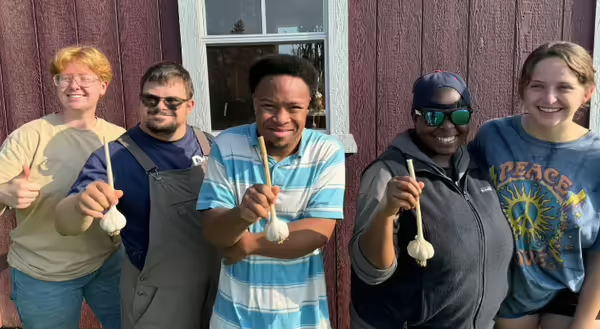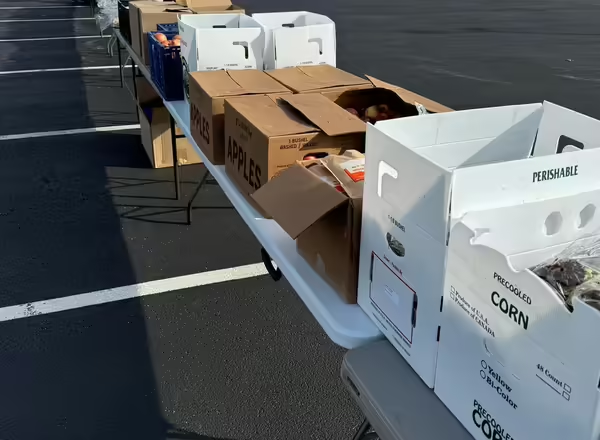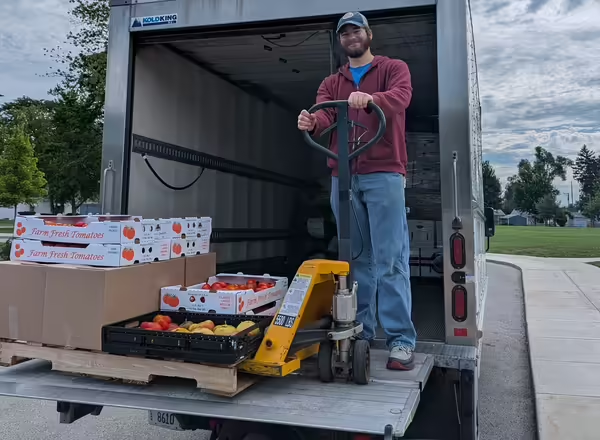
Rooted For Good is the glue that binds together the many helping organizations in DeKalb County. When the Local Food Purchase Assistance program was announced, the group’s leadership knew they were well positioned in the communities they serve to fully embrace the grant’s mission of building a more resilient fresh-food network for families in need.
The group has a long history of creating the space for collaborative work, allowing different groups, all with unique missions, to accomplish their goals together. Taking lead on the LFPA grant application allowed Rooted For Good to set the direction of the grant while ensuring smaller organizations were not left out, say Heather Edwards, executive director.
“This grant allows us to look out for all of us,” Heather says. “With this grant, we are now even more connected to the pantries.”
Positioned for impact: Rooted For Good’s existing efforts
Rooted for Good, formerly known as the DeKalb County Community Gardens when created by Dan Kenney in 2012, initially focused on growing and distributing fresh produce through school and community gardens. It still does that work and so much more. It rebranded in 2024 to reflect its expanded breadth of work to address the root causes of hunger.
“We are more than just a garden,” Heather says. They collaborate with a variety of organizations to “bring in services to help our neighbors and lift them up.” Clients benefit from this one-stop-shop approach.
- The group’s mobile food program provides food for 100 to 250 households a week, holding nine to 12 different distributions a month, including at a senior complex where 50% of the individuals have no form of transportation. Home delivery is also available to about 40 families weekly.
- Educational agricultural and horticulture training for adults with developmental disabilities is provided at the vocational farm.
- Volunteer experiences offer life-enriching service opportunities for those looking for ways to build stronger communities, including help with food distribution and delivery, school garden lessons, and vegetable production.
- The garden sites produce 3,000 pounds of produce annually, and the school gardening program reaches 1,200 students. Rooted For Good currently offers rental garden space to the public, and all plots in the three rental gardens are currently rented. The group plans to expand the rental ground next year. Illinois Extension provides expert gardening advice through its Master Gardener program.
- These efforts also support a brick-and-mortar food pantry in Genoa which serves about 150 households per month. The pantry provides classes and rents its commercial kitchen.
IL-EATS grant expands fresh food offerings
In early 2023, the group stumbled on a new USDA grant program that provides funds to purchase and distribute local, farm-fresh foods to underserved communities. The Local Food Purchase Assistance program operates in Illinois as IL-EATS (Illinois Equitable Access Towards Sustainable Systems) and is supported by University of Illinois Extension.
“It ties directly with our mission of connecting people with the land as an opportunity for personal improvement, helping people connect with our local economy to source food for themselves,” says Karson Paris, associate director. “It just makes sense we would want to be a part of it.”

Heather appreciates the inclusive nature of the grant that allows for smaller organizations like theirs to be selected. Whereas some states reserved LFPA money for large food banks, Illinois offered the funding to organizations of all sizes.
“I hope we’ve been able to prove that a smaller organization is capable of doing this and doing it well,” Heather says.
“Our whole community has greatly benefited in ways it would not have if the grant had been more exclusive,” Karson adds. “We hope this has built a bond, and we want to continue that strengthen that, so if there are opportunities down the road that would accomplish that same purpose, we would still want to be involved in that.”
Starting with its existing network of producers and pantries, Rooted for Good expanded its reach and now aggregates products from 15 qualifying farms and organizes its distribution to 35 food pantries.
So far this year, more than $900,000 worth of fresh produce has been distributed to families in need thanks to the IL-EATS program. “It is really striking to see just how much food pantries can use if we have the supply to give,” Karson says. “We could probably double that.” Prior, produce was often expired and unusable by the time pantries received it from the food banks.
“There has always been a lack of high-quality fresh produce in our food pantries,” Karson says. “Bringing that high-quality fresh produce to our pantry gives our neighbors the dignity of having high-quality food.”
Only 5% of that funding has been used for administrative purposes. The workload for the team has greatly increased along with the opportunities. “It takes people to make things go,” Heather says. Rooted For Good hired an additional staff member, Joe Ruehl, to receive the farm products and organize the distribution to the pantries.
Mastering the logistics
At the beginning of the season, each cooperating farm gave an estimate of the products and volume they could provide throughout the growing season. Bookkeeper Bernie Boona then divided the available produce based on requests from each pantry, ensuring adequate supplies without wasting unused products. The group conducted a recent survey of households to ensure they were procuring the products families want and would use.
“We have partnered with local farmers in the past, and this grant helped us expand that partnership which we find extremely valuable,” Karson says. “It’s been awesome to bridge that gap between farmers and consumers.”
Each Monday through Wednesday, farms deliver their products to Rooted For Good’s rented distribution center. Pantries consolidate their food-sourcing efforts into one weekly pick up at Rooted For Good.
Every aspect is carefully monitored, from quality of products and distribution to farmer payouts and reimbursement from the grant funds.

Heather is proud of the variety of products they can now purchase with IL-EATS funds, including 28 different types of fresh vegetables, eggs, dairy, and protein products from farms including Quarry Farms, Kakadoodle, Deerland Dairy, and Family Farm Meats. Since all products are straight from the farm, they are guaranteed fresh.
Rooted For Good is embarking on a capital campaign in 2025, hoping to finance a new facility that will allow people access to lockers of food 24/7. “With that facility comes a lot of opportunity,” Karson says.
It’s more than just food, Heather believes. “We are helping people up and out, not just with their immediate needs, but to help a person into their future” with resume writing and business assistance. Entrepreneurs will benefit from the planned commercial kitchen and storage facilities.
Post-grant forecast
Funding from IL-EATS ends mid-2025, and with it, the opportunity to purchase the variety of foods currently available. Still, Heather believes the partnerships they’ve created with local farmers will remain strong and hopes, with this boost in revenue and greater financial security, farmers will continue to offer a wide variety of products to the pantries.
“The farmers are grateful,” Heather says. “It’s helping them do things they would not have been able to do before because they have a reliable income and know what they’re going to make off of it.”
So, the work will go on after the grant cycle ends.
“We would all like to not have a job; to find that magic thing to make hunger and poverty disappear,” Heather admits. “That’s a big system; there’s a lot involved to make that end.”
In the meantime, Rooted For Good will continue bringing others with similar passions together for the greater good of their neighbors in DeKalb County. There is a strong community-wide passion to see their effort through, Karson says.
“The need doesn’t go away, and that’s a strong driver for our organization’s growth; to see the diversity of need that exists and find ways this organization can fill those gaps. That’s why we exist.”
Learn more about Rooted For Good at its website. To find out more about how one can support the capital investment campaign, contact Heather at 779-212-9543 or email hedwards@rootedforgood.org.
Pictured in the first photo from left to right: Rachel Colwell (Rooted For Good's Lead Grower), Michael Castritsis, Glenn Armstead, Debra Johnson, and Maggie Carey (Rooted For Good's Job Coach).